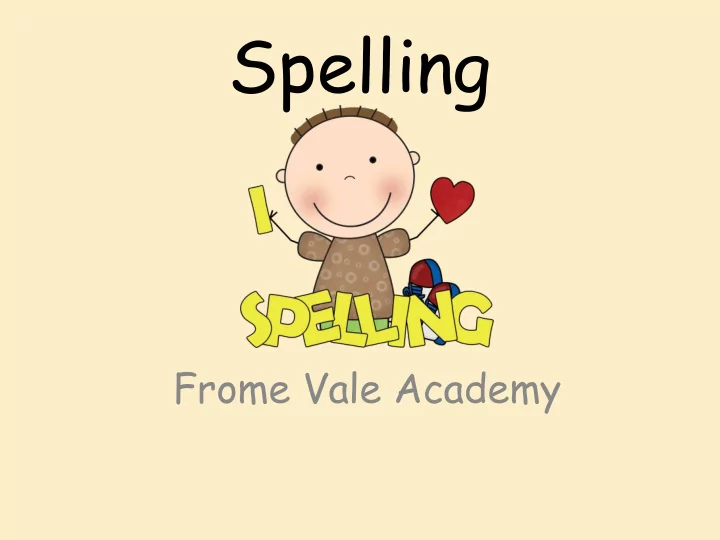

Spelling Frome Vale Academy
Finding out…. • about spelling within the new primary curriculum • how spelling is being taught in school and what is considered to be good practise • how you can support spelling at home
Have a go! In a puiltacibon of the New Scnieitst it siad you cuold jublme all the letetrs in a word and as lnog as eh frist and lsat were the same, reibadailty wolud hadrly be aftcfeed. We olny need the frist and lsat letetrs to spot chganes in meniang.
How do we spell? Spelling is a mental process and we can use a variety of different learning styles to help us. Visual- Does it look right? Auditory- Sound it out Kinesthetic – hand movements Linguistic – Why is it spelt like that?
2014 Curriculum Expectations • Increased in expectations across all year groups • Focus on spelling rules and conventions • Focus on word roots and origins • Word lists are demanding • Skills need to be embedded within independent writing
What does GHOWBTAPTEAU spell? GH OW BT A PT EAU GH is P, as in hiccough OW is O, as in bow BT is T, as in doubt A is A, as in acorn PT is T, as in pterodactyl EAU is O, as in beau
Spelling Tests: Problems • Children rarely commit spellings learnt for a test to their long-term memory • Some get 10/10 but then fail to spell these words correctly in their writing • Can lead to poor self-esteem for children who practice but then don’t get many correct • Can create an unhealthy competition • Gives teachers little information about the spelling skills children need to develop
Research: What does it say? Teaching children strategies for correcting spelling is far • more important than giving them the correct spelling of a word Spelling strategies and major spelling patterns are taught • much more effectively through lessons than through workbooks or spelling tests If children learn spellings for tests and don’t use those • words in their own writing, they will forget them within days Individualised spelling dictionaries are useful as children are • trying to get a grasp of new spellings Children often get key rules wrong. The top 12 misspelt • words were the same for the 7-10 age group as for children aged 11-14 There’s a need for both schools and parents to spend more • time on the basics
Research: What does it say? We often wrongly assume that if children • read widely they will be good spellers. This presupposes they are understanding and processing every word Children need to be taught why words are • spelt as they are. They love to hear where words come from e.g. ‘ghost’ has an ‘h’ because Flemish typesetters brought it over here used the Flemish word, which was ‘ gheest .’
What Are Effective Schools Doing? • Arranging training for all staff • Structuring spelling so that it is taught across several sessions each week • Using the teaching sequence: Revisit - Teach - Practice - Apply • Providing opportunities for children to investigate, make generalisations, discover rules and embed their learning • Supporting the use of individual spelling logs • Using a range of visual, auditory and kinaesthetic approaches • Assessing spelling termly through children's writing and activities (e.g. cloze procedures) • Building the word list words into teaching as appropriate • Keeping parents informed
What we do at Frome Vale In Year 3 and 4 • Teach National Curriculum spelling objectives • Daily spelling/handwriting sessions using the No Nonsense Spelling programme • All children use a spelling journal during the day • Termly spelling test covering spelling rules taught and a selection of the Year 3 and 4 New Curriculum spelling list In Year 5 and 6 Same as Year 3 and 4 but using Year 5 and 6 New Curriculum spelling list
Spelling Journals Why have one? • Children take responsibility for their spelling learning • Children can look back at their previous learning • Teachers can see how children are tackling tricky bits of spelling • Teachers and pupils and talk about spelling with parents
Spelling Journals
Spelling Journals
Spelling Journals
Tips for learning spellings at home • Encourage, support and praise! • Being a good speller is about knowing what to do when we get stuck and how to correct our mistakes. • Learn spellings in various ways.
Recommend
More recommend